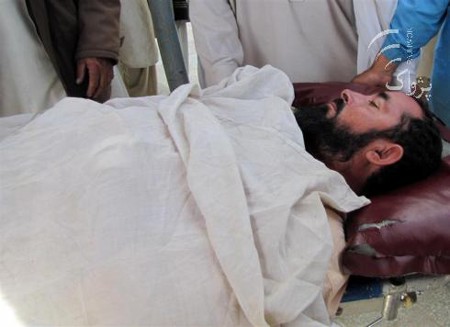By Alissa J. Rubin

PAN, Oct. 13, 2011: A prisoner was beaten nearly to death in custody by intelligence officials at a detention facility in southeastern Khost province, the victim's family and a medical officer claimed on Thursday, but the allegation was rejected by officials of the provincial National Directorate of Security (NDS). (Photo: PAN)
KABUL, Afghanistan — An itinerant preacher who had been detained for 12 days by the Afghan intelligence service arrived at a hospital badly beaten, suffering from kidney failure, and slipping in and out of consciousness, said doctors at the hospital and local health clinic where he was treated Thursday. They said they were not sure he would survive.
The man was admitted to the hospital in the eastern province of Khost on Wednesday morning, said the doctors, who requested anonymity because they feared retribution from local members of the intelligence agency, the National Directorate of Security.
This week the United Nations released a detailed report concluding that torture by the Afghan agency and the police was common and entrenched at some facilities, even as the United States and other Western nations finance and train the Afghan security forces. The Khost Province office of the intelligence agency was one of five where the United Nations report said that it found “compelling evidence of torture” to obtain information and confessions.
“We are aware of the incident and we are monitoring the situation,” said Georgette Gagnon, who is in charge of human rights for the United Nations Mission in Afghanistan.
Afghan intelligence agents wearing local dress known as shalwar kameez swarmed the public hospital in Khost City, the capital of Khost Province, where the man, Maulavi Abdullah, 30, was admitted Wednesday. They kept both doctors and reporters from talking to the patient with the exception of two doctors who were treating him.
“The detainee has been beaten really badly, and both his kidneys may have stopped working,” one doctor said. The man cannot drink and is being given fluids by IV, the doctor said, adding, “There are no signs of torture on his body or open wounds, but he has been kicked and punched in the belly, which may have damaged his kidney and other internal vital organs.”
At the intelligence directorate in Kabul, the spokesman, Lutfullah Mashal, said: “We do not have any official report yet on the incident in Khost.”
He said that two previous deaths in detention, in Takhar and Badakhshan, were both investigated and that the detainees had died from natural causes.
Beatings and torture have long been part of the local detention culture, especially for the intelligence service, which is under pressure to get confessions so that cases can proceed to rapid trials.
In the wake of the United Nations report, the intelligence directorate and the police have said that they are instituting reforms to safeguard against torture and that the American military is working with them to help teach alternative methods of interrogation that do not involve torture as well as setting up a monitoring program.
Khost Province, which has a long border with Pakistan, is heavily infiltrated by Taliban, many of them with ties to the Haqqani network, a particularly brutal offshoot with extensive organized crime interests in southeastern Afghanistan.
The heavy insurgent presence does put the intelligence service under heavy pressure to intercept insurgents and try to determine where they will strike next.
Family members of the detainee said that Maulavi Abdullah was a high school teacher in Sorbari district and also served as a mullah at a village mosque. In addition, they said, he is an itinerant teacher of the Koran. Such teachers go from village to village and stay for as long as the community welcomes them, teaching the Koran in the mosque and occasionally meeting with other itinerant evangelicals.
Maulavi Abdullah was at one of these meetings in Khost City 13 days ago when, on his way home to Sorbari district, he was detained by intelligence agents, said his younger brother, Maulavi Habibullah.
“He has been beaten with ruthlessness,” Maulavi Habibullah said. “Whenever you touch a part of his body, he shouts in pain. He has not urinated in the past few days, except once he urinated, which was bloody urine.”
Sangar Rahimi and Sharifullah Sahak contributed reporting from Kabul, and an employee of The New York Times from southeastern Afghanistan.



